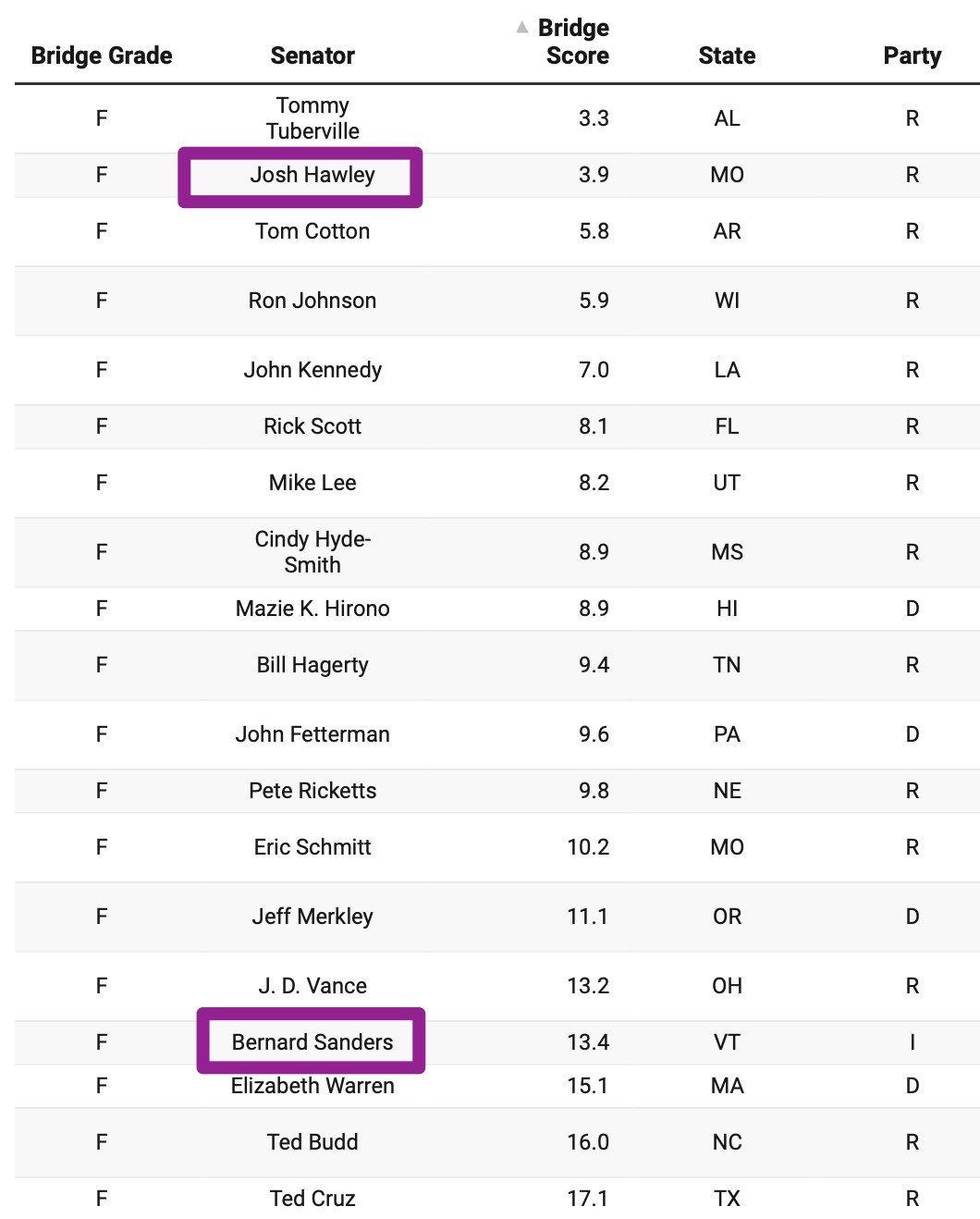🤔 I Didn't Have a Sen. Hawley and Sen. Sanders Bipartisan Collaboration on my 2025 Bingo Card
But, you gotta love it. Big kudos to them.
At Bridge Grades, we give letter grades to politicians based on how collaboratively they govern compared to their peers.
Last term (the 118th Congress ending in 2024) Sen. Josh Hawley (MO) and Sen. Bernie Sanders (VT) both earned Fs for their lack of collaboration, low participation in building coalitions, and weak contributions to win-win solutions for our citizens’ common interests.
So it came as an exciting development when these two announced their unlikely alliance to co-sponsor a bi-partisan bill to cap consumer credit card interest rates in the opening weeks of the new term (the 119th Congress was sworn in on January 3rd).
This bill is noteworthy as exactly the kind of political leadership Bridge Grades hopes to encourage, so let’s raise a glass to Sen. Sanders and Sen. Hawley for listening to each other, finding a common interest, and co-sponsoring this bill together.
What’s the big deal?
Bridge Grades scored these two amongst the worst of their peers on collaborative governance in their previous term—two of 19 Senators who earned an F for personal attacks, excessive partisanship, and anemic collaborative legislative actions.

To be very clear, our Bridge Grades system doesn’t in any way consider the content of bipartisan bills, but rather rewards the behavior of co-sponsorship itself. Coalitions create win-wins. The wide popularity of placing caps on exploitative consumer credit card interest rates illustrates the positive effect of such collaborative governance.
Will Hawley’s and Sanders’s F grades go up?
Actually, no, because the F grade was based on their performance last term. Those Fs will sit on their historical report card forever. But, like in school, each term offers a fresh start and a new chance to earn a better grade with a new cohort of legislators. They all started on equal footing as they kicked off the 119th Congress in January. While their collab does not mean these two will automatically good grades for the full term, they have aced their first test, earning Bridge points with even more upside to the extent their legislation passes and is signed into law.
Curious how the 2025 grades will turn out? So are we. Be one of the first to get the 2025 mid-term grades and subscribe to Bridge Grades (it’s free).
More, please
Such coalition building has become all too rare amongst our elected leaders.
What’s striking is that neither legislator has spotlighted the concept of bipartisanship in their own communications about this bill. Conspicuous in its absence, the seemingly deliberate exclusion of the word bipartisan is indicative of how broken today’s incentives are to act (or not) as representatives of the people who elected them. It’s as though they are nervous about being called out for it.
And, yet, the sort of leadership demonstrated by these two Senators is exemplary with respect to the sort of collaborative governance so many Americans are hungry for. We hope to encourage more. So, let’s start celebrating it when we catch them in the act—even if they don’t want us to.
Footnote: How Bridge Grades are calculated
The Bridge Grades grading rubric is based on a combination of public inputs, including what they say, how they vote, and their legislative history. Read here if you want to go deeper.
As an example, in 2024, heavy weights were given to bipartisan legislation based on bipartisanship scores calculated by the Lugar Center and Georgetown University’s McCourt School’s “bipartisan index.” We also gave weight to data and rankings from Report Cards produced by GovTrack — notably their ranks of those who authored bills sponsored by someone from another party, or sponsored bills authored by another party.
This is why we see this collaborate bill as so remarkable and noteworthy.
Bridge Grades are a non-ideological report card for politicians. Instead of red or blue, Bridge Grades sort bridgers from dividers. Using 3rd party data, we grade politicians on their abilities to collaborate and build consensus solutions for the common interests of multiple parties. In aggregating data from multiple non-partisan 3rd party sources, Bridge Grade is like Rotten Tomatoes for politicians. It measures not “what” a politician thinks, but rather “how” the politician behaves.





